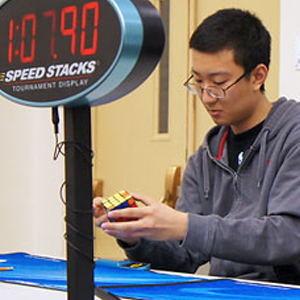
Evan Liu (S 2015)
Mathematical Sciences major, Rubik's Clock world record holder
Bio
Cubism
Staring intently at a scrambled Rubik’s Cube, Evan Liu (S’15) calculates the first move he will make. The CMU computational finance major is not alone in his concentration; he is among a group of competitors throughout the region who are vying to be the fastest at color-coordinating the cube’s six sides. But that’s only part of the challenge. For this particular event, the competitors have to do it with their feet. This could take all day.
The timer starts and Liu presses the puzzle against the ground. One foot holds the cube in place while the big toe of his other foot skillfully turns the colored squares. Amazingly, all the colors align in 91 seconds. His three-attempt average is less than two and a half minutes, about 30 seconds faster than the second-place finisher. Clearly, the Rubik’s Cube is no toy in the hands, or feet, of these competitors.
Liu can’t rest on his laurels; there are a total of nine events, everything from the one-handed challenge to the Rubik’s Clock. In addition, Liu organized the event for “speed cubers” like himself, so he has to make sure everything goes smoothly. Held in CMU’s University Center, the day’s contests are sanctioned by the World Cube Association, which unites all speed cubers and keeps records of the times at each event. Since his first competition in 2009, Liu has been solving the standard Rubik’s Cube about 100 times a day for practice. His personal record when using his hands is 6.23 seconds. Seriously!
After solving the Rubik’s Cube with his feet, he puts his shoes on and prepares for his favorite competition, the Rubik’s Clock, which has several connected small clocks with dials and wheels. To solve it, a person must make all of the clock dials face the same direction. Liu’s average solve time is 7.68 seconds, ninth best in the world.
When the timer starts, his hands swiftly flip the clocks back and forth, turning the wheels in a blur of control. He slams it onto the table each time it’s solved, and his five-attempt average is under 10 seconds, once again good enough for first place, this time by nearly seven seconds.
By the end of the 10-hour, nine-event competition, he’s won in six events and come in second in two others. The next day, the cube is still in his hands, and his feet, as he practices for the upcoming World Championships in Las Vegas, Nev. The practice paid off. He set a world record for solving the Rubik’s Clock with an average time of 6.79 seconds.
—Olivia London (DC’13)
This story originally appeared in Carnegie Mellon Today.